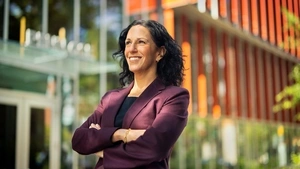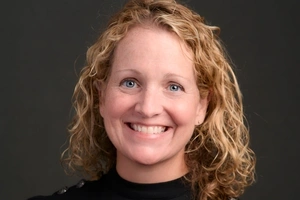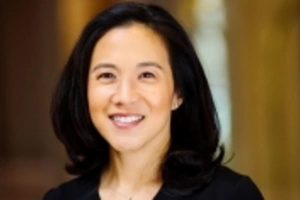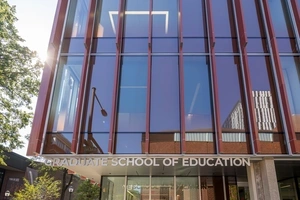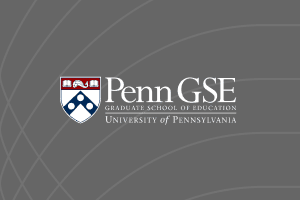Faculty Expert
-
Katharine O. Strunk
Dean, Graduate School of Education
Policy, Organizations, Leadership, and Systems Division
“Education has been a throughline of my life,” says Penn GSE Dean Katharine Strunk.
Growing up in Northern California, she describes her parents as focused on education and intent on making sacrifices for their family. School was always the priority, which was just fine with her; she loved school.
Her career in education began in earnest in 10th grade when she tutored low-income fourth grade students and began thinking about questions of access. “It changed my perspective on everything and particularly about what I wanted to do with my life,” Strunk recalls.
She knew she wanted to work in the field of education–something that would help more kids access better schools. As she thought about the direction of her career, as many students might relate to, while studying — first public policy at Princeton, and later economics at Stanford for her master’s — she kept on returning to her desire to make an impact for the greater good.
“For me, the question was always, ‘How do we ensure that the resources we have are reaching and benefitting as many people as possible.’ When I started talking about that question as a goal, I think people assumed, ‘This is someone who’s going to be a policymaker,’” Strunk says. “It was always a choice between doing something in the policy world, or becoming an academic, and I never knew which one. And I was able to combine them both in the end.”
Strunk completed her Ph.D. in Education Administration and Policy Analysis at Stanford in 2007; she served in faculty roles at the University of California, Davis, the University of Southern California, and most recently Michigan State University.
Over time, Strunk established a reputation as a leader in community-engaged scholarship, working together with schools and policymakers to enact evidence-based change. A proud example: She built a relationship with Los Angeles Unified School District and conducted a five-year study in collaboration with a qualitative researcher to provide moment-to-moment feedback that could be applied as evidence emerged. While at Michigan State, she led the Education Policy Innovation Collaborative, which ultimately informed the decision-making of Michigan Governor Gretchen Whitmer about the impacts of policy decisions being made in real time during the COVID-19 pandemic.
This type of collaborative approach, she says, “has allowed policymakers to better understand when interventions work and for whom they work,” and allows them to pull a lever that will enable them to more confidently reach their desired outcome.
Today, she’s bringing these concepts of collaboration and impact together for the Graduate School of Education’s (Penn GSE) new strategic vision, Together for Good: A Vision for Transformational Impact.
Together for Good
After beginning her tenure as dean in July 2023, Strunk learned a lot about Penn, and faster than expected.
In the spring, Strunk co-chaired the Commission on Countering Hate and Building Community with School of Engineering and Applied Science Dean Vijay Kumar. As part of that work, she met with faculty, students, and staff across the Penn community. “I think I learned more about Penn in six months than I would have in five years otherwise,” she says.
Through that work she learned, she says, “how much love people have for Penn and the understanding that it’s an imperfect place that’s always striving to improve.” Implementation of that report’s recommendations — along with those of the University Task Force on Antisemitism — is now being led by Deputy Provost Beth Winkelstein. Simultaneously, Strunk has led the effort to set a new course for Penn GSE, inspired in part by her work with the Commission, the vision of In Principle and Practice, and conversations with every faculty member and many students and staff at Penn GSE.
“Dean Strunk is an exceptional Penn citizen and is poised to lead Penn GSE to new heights, toward even greater impact in classrooms, schools, and legislatures,” says Interim President J. Larry Jameson. “Her ability to strategically unite the Penn GSE community and work with communities locally, regionally, and globally is evident in Together for Good, which itself draws from the values of Penn’s strategic framework, In Principle and Practice. I look forward to seeing how Penn GSE’s inspiring students and dedicated faculty collaborate to address the great challenges of our time in education.”
Together for Good, Penn GSE’s first strategic vision in nearly two decades, was the result of hundreds of conversations with Penn GSE’s faculty, staff, students, and alumni. Building upon the School’s 110-year history of measuring success by its positive impact, Together for Good identifies four priorities for the Graduate School of Education, which are encapsulated by their vision statement:
“Penn GSE will lead the world in producing consequential research and preparing learners to be impactful educational practitioners, scholars, and changemakers who work with diverse communities worldwide to define profound possibilities, address complex challenges, and secure education as the bedrock of democracy.”

The community-driven visioning process asked one key question: What do we want to be true of education in 10 years?
“Once we posed this question to our community, it wasn’t hard to boil it down to four priorities,” says Strunk. “With a faculty like Penn GSE’s, which includes experts in so many different areas, I was expecting their ideas to be like a scatterplot, and instead there was a common trajectory: People were really focused on the same things, and can see themselves reflected in these four priorities.
“The Penn GSE community — faculty, staff, students, and alumni — are all rowing in the same direction, and I don’t think that’s common in an education school — or any school.”
The plan, she adds, enables Penn GSE to, “pursue the future as a unified school with shared purpose and renewed focus on community engagement to ensure we continue to improve outcomes for people in our society.”
Together for Good, in action
Strunk cites several areas where this work is already happening, or where initiatives are being cultivated to accelerate impact.
One of Strunk’s early areas of focus has been on deepening Penn GSE’s relationship with the School District of Philadelphia, working closely with them to meet the needs they identify and, ultimately, building a national model for what collaboration between a school district and a university should be. In spring 2024, the District expressed a desire to partner with Penn GSE experts on the best ways to implement AI in the classroom in ways that are ethical and driven by evidence-based research on how people learn. The Penn GSE team got to work, developing and securing donor support for a three-tiered professional development program for district administrators, school leaders, and teachers throughout the city.
Penn GSE is preparing to announce a new online degree program in Artificial Intelligence, the first of its kind for an Ivy League school of education. She says that multiple faculty members are working in the field of AI and education, and efforts are ongoing to partner with other Penn Schools and Centers.
Penn GSE is also focusing on educational leadership across the learning lifespan. Launched with a $10M gift in 2023, the McGraw Center for Educational Leadership is a destination for thought leaders to identify and solve big problems facing education across sectors. They are in the midst of searching for a new executive director of the Center and seeking a new tenure track faculty member who focuses on K-12 educational leadership.
The first priority in Together for Good commits Penn GSE to preparing and sustaining a diverse, highly skilled education workforce. Strunk is championing an ambitious effort to dramatically reduce the cost of teacher and leader preparation programs and make nondegree professional learning more affordable. “Our nation and our local community face a catastrophic shortage of teachers,” Strunk notes. “Penn GSE produces some of the nation’s very best teachers and we are committed to making these programs far more affordable.”
Another of Penn GSE’s strategic priorities is to elevate education’s role within democratic society. Strunk believes this must start locally, within Penn GSE. To foster dialogue across differences, the School selected the book Try to Love the Questions, by Lara Hope Schwartz, as its school-wide read for “One Book, One GSE.” The School has developed yearlong programming around the text, inspiring students, staff, and faculty to embrace discussions across difference as opportunities to learn, recognize shared humanity, and find common ground. But this commitment extends beyond the walls of Penn GSE’s newly renovated building.
“It is our responsibility as a school of education, and at a place like Penn in the birthplace of American democracy, to make it fundamentally clear that education is the bedrock of a just and thriving society,” says Strunk. “Democracy needs high-quality Pre-K-12 schools, colleges, and universities that prepare students to be critical thinkers and engaged citizens. Penn GSE’s faculty has great expertise in this area, and we are ready to put that knowledge to work across the field of education.”
Looking ahead
To catalyze these efforts, Penn GSE will launch Dean’s Office Strategic Priority Seed Grants, which are four grants available to faculty members – one for each of the school’s four strategic priorities. Faculty members are encouraged to apply with another faculty member across more than one division in the School. Grants will be awarded in the spring semester and are intended to foster interdisciplinary and innovative research that further each of the priorities and will eventually lead to a broader, larger-scale, and externally funded study.
“At Penn GSE, innovation doesn’t just mean doing what’s new, it means innovating for the public good to meet the needs of the world. We’re not just innovating to create the next great ed tech thing that’s going to have an IPO and make billions of dollars,” she says, citing the work of Catapult at Penn GSE. “But Catapult and others are focused on research-based innovations that are going to improve outcomes for kids, educators, and learners across their lifespan.”
“Our goal with Together for Good is not just to meet the moment, but to make the moment in a spirit of togetherness,” said Strunk. “Our vision is built on deep collaboration—not only with educators, but also with policymakers, industry leaders, philanthropists, and communities around the world—because no single institution or sector can realize education’s brightest future alone.”
Strunk will discuss Together for Good in more detail at several events around the country, but—reflective of the School’s vision—it was important to Strunk to start the conversation at Penn. The first event is scheduled for Homecoming Weekend, November 16, as part of a fireside chat with School District of Philadelphia Superintendent Tony Watlington.
Media Inquiries
Penn GSE Communications is here to help reporters connect with the education experts they need.
